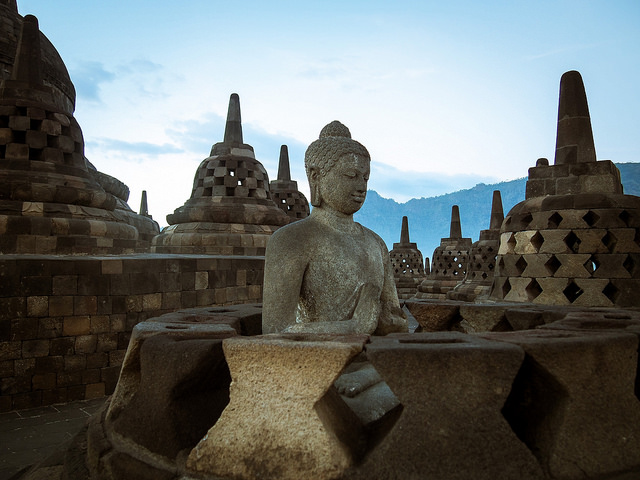
This post has been adapted from a recent ASPI panel discussion ‘Australia and Indonesia: getting back on track’. The full video of the event is available here.
To get things back on track, Australia needs to regain perspective, some of which has been lost in recent months amidst the understandable angst caused by the moves to execute Andrew Chan and Myuran Sukumaran.
Why do I talk about a loss of perspective?
First, because, strong as our feelings about the impending executions were, was the withdrawal of our ambassador wise? This was the first time we have taken such a step in relation to Indonesia, and it suggests that the executions were a bigger issue for Australia than our shooting war with Indonesia during Konfrontasi, the Balibo murder of Australian journalists, or other issues where we’ve had serious differences on matters touching on profound Australian interests. That to me does not ring true.
Second, I think that Australia, though for the best of reasons, allowed the issue to get out of hand. We started well, making high-level representations with real seriousness of intent and frequency, and there’s no doubt that the views of the Prime Minister, senior ministers and the parliament were registered at the highest levels of the Indonesian government. Nor should we overlook the effect of such activity on the groundswell of opinion in Indonesia against the death penalty. But at some point, the Australian megaphone was brought out, and we came up with a series of proposals that didn’t have the slightest chance of success. They also seemed increasingly desperate and in some cases counter-productive: offering to pay for the costs of life imprisonment for the two men; offering to repatriate Indonesian criminals; accusing Indonesia of double standards (a well-merited point of view but not one best calculated to sway opinions in a period of political heat). Our actions stirred up feelings in Indonesia, which took to grandstanding moves like the over-the-top prisoner transfer from Bali to Java and statements, some of them outrageous, from a range of ministers and parliamentarians.
As for the future, it’s not, of course, the first time our two countries have got into this sort of disagreement. We’ve had it in recent years over East Timor, Papuan asylum seekers, illegal fishing, boat towbacks, cattle exports and spying allegations, among others. And we’ve found ways to move on, impelled not by a search for improved relations but by the need to pursue our many national interests with Indonesia. That’s what we need to do now, and it’s a good thing that Julie Bishop has been reported in recent days as saying that it’s time to move on.
What should that entail?
First, our approach should, and I have no doubt will, be based on an assessment of our national interest.
Second, our ambassador should return soon. There’s no point in prolonging his absence, as this would only throw up the need for some additional rationale for keeping him longer. As it is now, he has had the chance to consult the government and should return in a low-key way to get on with his job in Jakarta. No further explanation would be needed.
Third, I don’t think that Australia should become hyper-active in trying to get things onto an even keel again. It’s best to keep out of Indonesia’s face, while getting on with all of our necessary and worthwhile ongoing activities there and looking to the resumption of other contacts in good time. For example, the postponed business delegation led by Andrew Robb could be planned for some time later; contacts on trade, aid, security and other issues should continue; and we should, without any sense of urgency, think about when it might be propitious to pursue senior face-to-face encounters.
In short, it should be an unhurried and calm approach based on national interest. Our Foreign Minister’s recent comments seem to be taking that approach, and the tone coming from Jakarta in recent days, including in response to the announcement of Australian aid reductions, seems to be encouraging and consistent with such a line.
At the same time, I sound a note of caution for the future, based on wider considerations than the recent disagreements over executions. It’s unrealistic to think that we will, any time soon, return to the sort of partnership with Indonesia exemplified by our joint initiatives over the last decade on issues like regional people movement, illegal fishing, disaster relief or counterterrorism, or by our agreements to hold annual meetings of senior leaders. Some of that joint work, for example on counterterrorism, will certainly continue. But the Yudhoyono years are now decidedly behind us and we don’t have, in President Jokowi, a leader who is so disposed to make allowances for Australian sensitivities and priorities, or instinctively well-disposed to the West in general. Indeed, Jokowi doesn’t seem to have a strong interest of the SBY type in foreign relations, apart from economic ones.
Despite the fractiousness evident on both sides during our recent election campaigns and subsequently, neither country appears now to have an interest in putting more fuel on the fire. Certainly, it’s difficult to see what we might hope to achieve by prolonging a stand-off. We do have many elements which work in ways conducive to our long-term interests in Indonesia, in areas as diverse as security cooperation, multilateral arrangements in the Asia–Pacific and the new Colombo Plan. We should get on with these, seeking to develop them further where we can and where it’s in our interest to do so.

